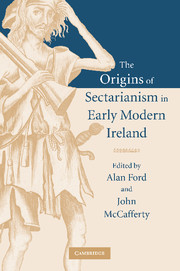Book contents
- Frontmatter
- Contents
- Preface
- List of contributors
- List of abbreviations
- 1 Living together, living apart: sectarianism in early modern Ireland
- 2 Confessionalisation in Ireland: periodisation and character, 1534–1649
- 3 Protestant prelates or godly pastors? The dilemma of the early Stuart episcopate
- 4 ‘In imitation of that holy patron of prelates the blessed St Charles’: episcopal activity in Ireland and the formation of a confessional identity, 1618–1653
- 5 A haven of popery: English Catholic migration to Ireland in the age of plantations
- 6 The Irish historical renaissance and the shaping of Protestant history
- 7 Religion, culture and the bardic elite in early modern Ireland
- 8 The political and religious thought of Florence Conry and Hugh McCaughwell
- 9 Sectarianism: division and dissent in Irish Catholicism
- 10 Purity of blood and purity of faith in early modern Ireland
- 11 Concluding reflection: confronting the violence of the Irish reformations
- Index
5 - A haven of popery: English Catholic migration to Ireland in the age of plantations
Published online by Cambridge University Press: 24 November 2009
- Frontmatter
- Contents
- Preface
- List of contributors
- List of abbreviations
- 1 Living together, living apart: sectarianism in early modern Ireland
- 2 Confessionalisation in Ireland: periodisation and character, 1534–1649
- 3 Protestant prelates or godly pastors? The dilemma of the early Stuart episcopate
- 4 ‘In imitation of that holy patron of prelates the blessed St Charles’: episcopal activity in Ireland and the formation of a confessional identity, 1618–1653
- 5 A haven of popery: English Catholic migration to Ireland in the age of plantations
- 6 The Irish historical renaissance and the shaping of Protestant history
- 7 Religion, culture and the bardic elite in early modern Ireland
- 8 The political and religious thought of Florence Conry and Hugh McCaughwell
- 9 Sectarianism: division and dissent in Irish Catholicism
- 10 Purity of blood and purity of faith in early modern Ireland
- 11 Concluding reflection: confronting the violence of the Irish reformations
- Index
Summary
On 22 February 1594 the Privy Council issued instructions to the mayor of Chester requiring him to detain and examine all strangers arriving in the city who were then passing either to or from Ireland. Unlike its previous instructions, the Council insisted that this time the mayor should not confine his inquiries exclusively to people of Irish birth. Every traveller was to be stopped, English, Irish or foreign, for it was concerned by the activities of religious, not ethnic, interlopers moving between the two kingdoms. Within barely six weeks stop-and-search tactics had produced the desired result: the arrest and detention of three fugitive English Catholics en route to Ireland, in the shape of two boys, aged eleven and twelve, and a disfigured middle-aged man with ‘an artificiall lefte eye’. The man, Edward Cowper, was a servant of Mrs Agnes Mordaunt, a convicted recusant from Oakley in Bedfordshire and a relative through marriage of Lord Mordaunt, a senior Catholic nobleman. The Mordaunt connection seemed significant. For several years the heir-apparent to the Mordaunt title, Henry Mordaunt, had been defying the Elizabethan government over religion; punishment had not tamed him. In the period prior to the Chester arrests he had become a close associate of Sir Thomas Tresham, the principal English recusant then imprisoned in the Fleet in London. The mayor was authorised to question the detainees.
- Type
- Chapter
- Information
- The Origins of Sectarianism in Early Modern Ireland , pp. 95 - 126Publisher: Cambridge University PressPrint publication year: 2005
- 9
- Cited by



